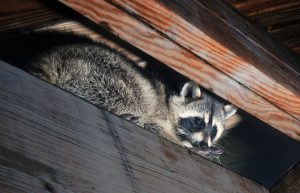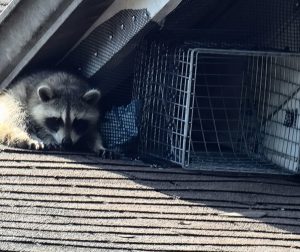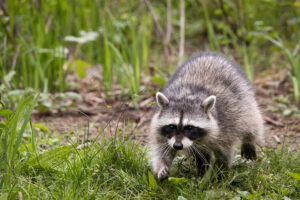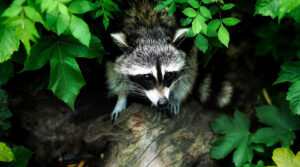It’s happened to nearly all of us: we leave trash outside, resolve to put it into the trash can, and promptly forget about it. Then the following morning, when we walk outside to meet the day, we are met instead by a yard strewn with trash. This is, in all probability, the work of a raccoon.
Raccoons are extremely opportunistic animals that have adapted remarkably well to human life; they sometimes seem purpose-built to drive homeowners crazy.
Let’s discuss some measures you can take to ward these troublesome creatures off.
How to Keep Raccoons Out
If the above scenario is to be avoided, you should start thinking about methods to prevent raccoons from coming onto your property. Like every animal, raccoons seek primarily three things: food, water, and shelter.
Raccoon prevention is mostly a matter of eliminating access to those three things to the greatest extent possible. Store all food that raccoons could conceivably get to—especially pet food—in sealed containers.
Also, seal or cover any entry points, such as pet doors, vents, or your chimney. Another good idea is to cut back overgrown trees and bushes that raccoons could use to climb onto your house or attic—you might even make your yard look better in the process.
Types of Raccoon Repellents
There are a lot of natural “animal repellents” out there, so many that it’s often hard to determine which ones actually work—it’s not something science explores with great diligence.
Generally, raccoon repellents provide a temporary solution. Raccoons are intelligent and tenacious critters. If your home has the resources the animal wants, the raccoons will get used to these repellents and start to ignore them.
Some of these repellents have a strong scent that raccoons hate. The odor eventually dissipates so a constant reapplication is necessary. Other deterrents rely on an alarming sight or sound to keep raccoons away.
Raccoons hate the smell of vinegar, especially apple cider vinegar. You can simply fill a spray bottle with it, add a bit of water, and spray it wherever you imagine raccoons may be trafficking. You can also soak cotton balls with them and place them strategically around your house.
This can be purchased online or from a hunting store. When a raccoon gets a whiff of coyote urine, their instinctual fear of coyotes kicks in, and they scramble to evade the nonexistent predator. Coyote urine can be bought in liquid, powder, or capsule forms. The liquid can be sprayed on plants around the house, the powder placed around the perimeter of your property, and the capsules can be planted in the ground for a longer-lasting deterrent.
Ammonia is a chemical contained in urine that raccoons don’t like one bit. It can be purchased online or from a home improvement store. You can soak rags in ammonia and leave them around your property or leave out bowls of uncovered ammonia.
Sprinkling a bottle of hot sauce might work. Raccoons have a sensitive sense of smell and will avoid cayenne pepper.
Peppermint oils are a natural alternative to try to repel raccoons.
These devices work by emitting a continual, high-pitched sound that isn’t audible to humans, and are meant to drive many animals away—not just raccoons. There are two major caveats to these devices, though: first, they usually need to be plugged into work, and the raccoon family in question might not always be located near a power outlet. Secondly, the ultrasonic frequencies these devices emit can be bothersome to pets, especially small pets like guinea pigs.
Mild Harrassment Techniques
Like any of us, raccoons have the capacity to be annoyed—something that can be used to your advantage. Mild harassment techniques are harmless, easy ways to dispel unwanted wildlife.
Since they are primarily nocturnal animals, raccoons don’t like excessive light. Simply aiming a flashlight at their den and leaving it there will likely convince the raccoon that the area isn’t safe, prompting them to relocate.
Grab a radio and place it near the den’s entrance. Interestingly, raccoons have a greater tolerance for the sound of music than they do for human voices, so tune it to an all-talk show, and consider warning your neighbors if you think it might be an annoyance.
Whichever technique you choose, be sure to turn off the device periodically, The MSPCA recommends that you turn these devices off periodically, so the mother will feel safe to re-enter to retrieve her young.
Protect Your Garden
It is nearly impossible to prevent a raccoon from ever entering your yard. There are some things you can do to make it less attractive. Removing your bird feeders eliminates an easy food source for raccoons. Vegetable gardens and fruit trees will attract raccoons. Make sure to harvest often and do not leave fallen fruit and vegetables on the ground.
Motion-activated sprinklers provide a temporary deterrent. Raccoons will grow accustomed to it and learn how to avoid it. An electric fence at least four feet high is the best way to protect your garden from raccoons.

The Best Raccoon Repellent
Raccoon repellents and deterrents have limited efficiency at best. Some simply do not work. The best way to keep raccoons out of your house is exclusions. If that’s the case, call a wildlife control company such as Trutech Wildlife. Our team has the knowledge, compassion, and equipment to evict even the most stubborn raccoon family from your home in an efficient and ethical manner.
Call Trutech In to Get Raccoons Out
- This insulation is made of recycled material, such as paper, treated for fire resistance. Blown-in cellulose belongs to a category of green, renewable solutions that go hand-in-hand with high performance.









